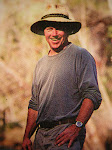 |
| River otters love nothing so much as a mouthful of crayfish |
It was as quiet as one would
expect of a thirty five degree morning as we carried boats and gear down to the
Ichetucknee launch deck. Aside from my friend John Drum, who was also gearing
up for a paddle, the only other sign of life on Ichetucknee this morning was a
johnboat that came puttering up to the dock just as our group was launching.
The johnboat was loaded to the gunnels with cameras, gear and thickly-bundled
people, including scientist and cave-diver extraordinaire, Tom Morris. I knew
from previous correspondence with their producer that this was a film crew from
the U.K.. They had come to film river otters for a BBC documentary.
River otters are common on the
Ichetucknee. Some mornings, as I am staging my boats for a tour, a group of
otters will swim past the launch deck. They begin near the head spring and
slowly make their way down the run, diving and poking into every submerged
crevice and clump of Sagittaria in their energetic search for breakfast. Aided
by sensitive whiskers, excellent underwater vision and a prowess common to many
mustelids (the weasel family), they usually surface with a mouthful of food. In
other parts of the country, they main prey are fish. But, in the spring-fed
rivers of North Florida, they seem to relish nothing so much as a crunchy
crayfish. In fact, I often hear the crunching of approaching otters before I
see them.
 |
| Otter fur is so efficient its skin rarely gets wet |
Another telltale sound of river
otters is their huffing. When they dive, otters close their nostrils (and ear
openings). When they resurface, they blow the water from their nostrils like
little construction workers. Over the years, I’ve come to recognize the
enthusiastic crunching and bubbly snorts of approaching otters as surely as my
dog Murphy recognizes the jingling of my truck keys. And both sounds are a call
to action. In Murphy’s case, it means lunge for the door. For me, it’s a signal
to freeze.
The best thing about hearing
crunchy snorts (I will call them that until corrected by an accredited
snortologist) is that it means the otter hasn’t seen me. If I freeze or, even
better, crouch behind some cover, I will likely have a grandstand seat for one
of my favorite wildlife encounters. Nature rarely gives advance notice—and never
so pleasantly as the soft, wet snorts of a river otter.
Such are the moments that have
steered many bright-eyed youngsters into
careers with nature. Ask any nature photographer, nature writer, or park
ranger and you’ll probably hear a story of an encounter like this. If I asked
the half dozen Brits huddled on that boat, I’m sure I would have heard a half
dozen tales involving wonderful animals I have only heard about.
